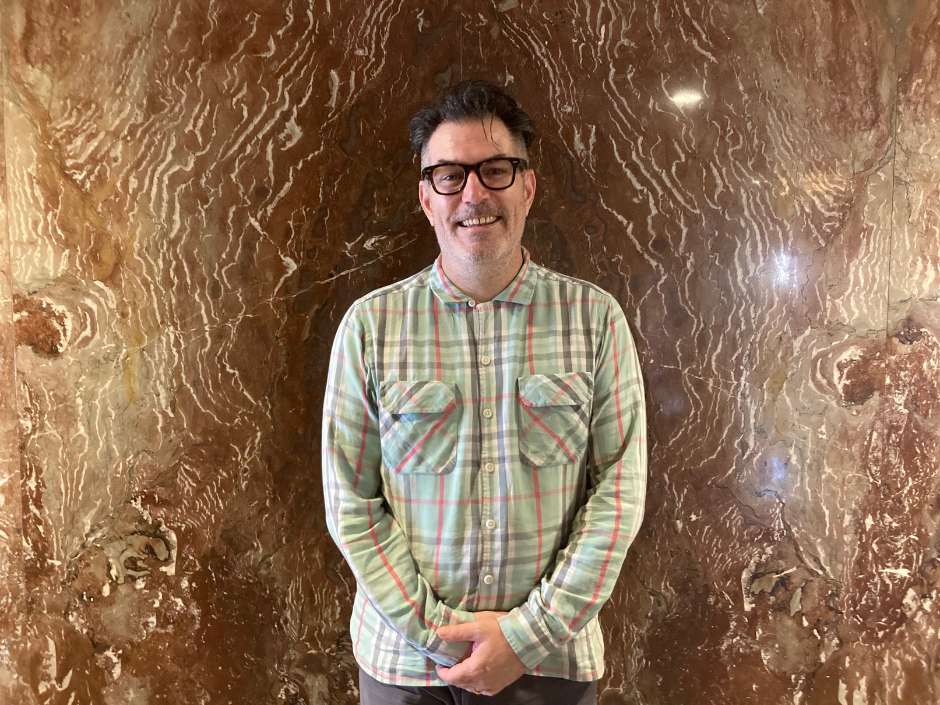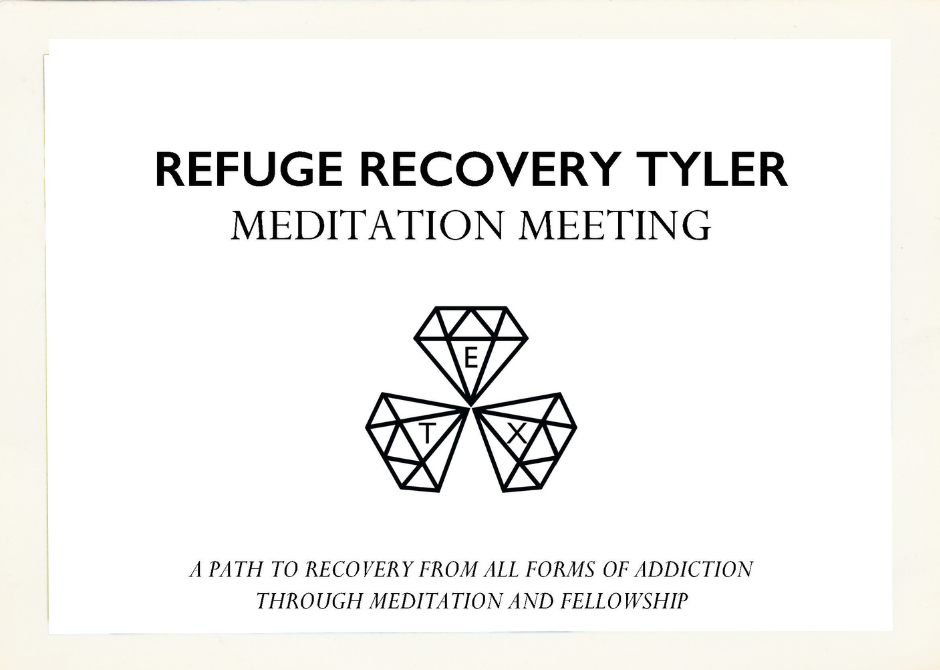
📷 Jane Neal
Refuge Recovery, a new group in Tyler, launches Friday to provide addiction recovery through meditation and fellowship.
Aaron Fagan, the group’s representative, said the Buddhist-inspired meetings are a peer community for anyone suffering from addictions to drugs, alcohol and all manner of process addictions such as pornography, gambling, shopping and tech.
Participants can attend weekly meetings Fridays beginning June 16 from 4 to 5 p.m. in Suite 602 at Mosaic Counseling Center, located in the Regions Bank building.
Each week, the group will experience a 20 to 30-minute meditation, followed by a reading and an open discussion. The group’s primary text is Refuge Recovery by Noah Levine. Fagan said Mosaic Counselor Center has welcomed the group, but they are unaffiliated with Mosaic.
Originally from the Finger Lakes region of New York, Fagan has lived in Tyler for a year and a half. Since beginning his sobriety on September 15, 2003, Fagan has leaned on recovery groups for teaching and support.
He has seen Refuge Recovery serve as an effective alternative or supplement to traditional 12-step programs.
Fagan said Refuge Recovery does not emphasize belief in a higher power, but “gives people kind of a sandbox to explore and discover a little more freely and less rigidly what a spiritual solution might look like or mean for them individually. What that solution is — that’s for you to explore and discover for yourself,” Fagan said.

Refuge Recovery’s guiding principles are called the three jewels: awakening, teaching and community.
Fagan said the three jewels are transformative when used together. “Awakening is the acknowledgment of our innate capacity to end the suffering of addiction and recover. But recovery can’t happen in isolation. We also need teachings, and we need the help of those who have their own experience with those teachings.”
Fagan said he needed the jewel of community to achieve sobriety. “Before I got sober, I tried to stop drinking on my own, and it didn’t work. There were too many blind spots, and that’s why friendship and fellowship are so valuable,” he said.
Refuge Recovery’s teaching component derives from Buddhism’s Four Noble Truths and the Eightfold Path, effectively creating 12 steps, which are “kind of the recipe for a spiritual experience,” Fagan said.
Fagan outlined the Four Noble Truths and the Eightfold Path.
The first of the noble truths acknowledges the truth of suffering. Fagan said suffering simply means wanting the present moment to be different from what it is.
The second truth says a person is the source of their own suffering.
“There’s the shock of recognition that I am the source of my own suffering,” Fagan said. “It’s not the world’s fault. The degree of suffering that I experience is totally contingent on me and how I experience the world and its events.”
The third noble truth says there is a way out, and the fourth points to the Eightfold Path as that way out. The Eightfold Path includes right understanding, right intention, right speech, right action, right livelihood and right effort, followed by right mindfulness and right consciousness.
Going around the eight phrases as a wheel, Fagan said the path asks people to check themselves.
“How well is it all working? Are all these things harmonized or synchronized? Is my understanding and my intention in alignment with what I say, what I do and what I’m doing for a a living?” Fagan asked.
As for right mindfulness, Fagan said it means restoring a relationship with the present moment.
“A lot of us retreat into addictions of all kinds because something broke in our relationship with the present moment. We were in full flight from reality, because this is where the pain and suffering exists. We retreat rather than being fully present.
“Mindfulness is about being able to locate the present moment; to be able to reconnect with the here and now,” Fagan said.
Speaking about his own years of addiction, Fagan said drinking worked for him for a very long time.
“But then it stopped working. I realized I had to change everything. I was left with no tools. Drinking was my one-size-fits-all tool for everything.
“I was too scared to live and I was too scared to die, which is a pretty awful predicament to be in.”
As Fagan sought sobriety, he found an unlikely mentor.
“My first sponsor had a snake farm in Oklahoma, and he was a used car salesman. We shared no common ground at all.
“But he loved me more than I could love myself. He showed me a way out of the hell that I was in. You couldn’t find two more unlikely people to love one another. But there we were,” Fagan said.
Fagan’s need for mentors and peers makes him a believer in the power of the group. “There’s this uncanny alchemy that works when strangers get together, united in a common purpose that allows them to be free of something that they can’t do on their own,” he said.
Fagan wants to dispel popular notions of meditation. “A lot of people think meditation means not thinking, quieting the mind or relaxation. I find that’s sort of a misnomer.
“It’s almost a third thing. It’s not sleeping and it’s not waking; it’s a third thing that gives us access to the best of both worlds, changing our relationship to the present moment and our place in it,” he said.
Over the years, Fagan participated in and led Refuge Recovery groups in Rochester and Kingston, New York, and in Fairfield County, Connecticut. “I’m trying to reconnect with that part of my recovery and journey and bring some of my experience to Tyler,” he said.
Fagan would like to see Refuge Recovery become a place where people can find an alternative or supplemental help for their recovery.
“And ultimately, to find refuge from the horrors of addiction.”
Meeting details can be found here and questions may be sent by email to [email protected]
Love what you're seeing in our posts? Help power our local, nonprofit journalism platform — from in-depth reads, to freelance training, to COVID Stories videos, to intimate portraits of East Texans through storytelling.
Our readers have told us they want to better understand this place we all call home, from Tyler's north-south divide to our city's changing demographics. What systemic issues need attention? What are are greatest concerns and hopes? What matters most to Tylerites and East Texans?
Help us create more informed, more connected, more engaged Tyler. Help us continue providing no paywall, free access posts. Become a member today. Your $15/month contribution drives our work.







